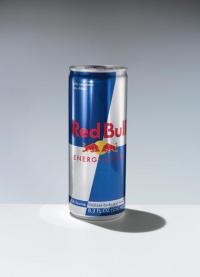
Red Bull Can Give You a Stroke
 Just one can of the popular stimulant energy drink Red Bull can
Just one can of the popular stimulant energy drink Red Bull can
increase the risk of heart attack or stroke, even in young people.
The caffeine-loaded beverage, popular with university students and
adrenaline sport fans to give them “wings”, caused the blood to become
sticky, a pre-cursor to cardiovascular problems such as stroke.
“One hour after they drank Red Bull, (their blood systems) were no
longer normal. They were abnormal like we would expect in a patient
with cardiovascular disease,” Scott Willoughby, lead researcher from
the Cardiovascular Research Centre at the Royal Adelaide Hospital, told
the Australian newspaper.
Willoughby and his team tested the cardiovascular systems of 30
young adults one hour before and one hour after consuming one 250ml can
of sugar-free Red Bull.
The results showed “normal people develop symptoms normally
associated with cardiovascular disease” after consuming the drink,
created in the 1980s by Austrian entrepreneur Dietrich Mateschitz based
on a similar Thai energy drink.
Red Bull is banned in Norway, Uruguay and Denmark because of health
risks, but the company last year sold 3.5 billion cans in 143 countries.
Willoughby said Red Bull could be deadly when combined with stress
or high blood pressure, impairing proper blood vessel function and
possibly lifting the risk of blood clotting.
“If you have any predisposition to cardiovascular disease, I’d think twice about drinking it,” he said.
Full Story: Reuters August 14, 2008.
Dr. Hooper’s Comment
Think about this for a moment. Sugar – Caffeine – Soft Drink. How did this become an ‘Energy’ drink?
Add some trace B group vitamins and we call it a ‘Health’ drink?
Energy drinks have been popping up all over supermarket and
convenience store shelves in recent years, and have overtaken bottled
water as the fastest-growing category in the beverage business.
No less than 3.5 billion cans of Red Bull were sold last year in 143 countries.
Yet questions regarding the safety of Red Bull, as well as other
energy drinks, keep cropping up at regular intervals when another young
party goer has a heart attack on the dance floor after 6 Red Bulls and
2 scotches and coke.
Researchers found that within a few hours of drinking various
‘energy’ drinks, blood pressure increases about 10 percent and heart
rates about 11 percent.
There is a transient decrease in reaction time immediately after the
drink. However after a few hours the reaction time is worse (longer),
than those who drank water instead.
Researchers note that the increase in blood pressure and heart rate
is of little importance for healthy young adults (the average age of
participants was 26) but these kinds of levels can be serious for
people with heart conditions.
One researcher said that these results can be “clinically significant”
for those who take medication to treat their heart condition as energy
drinks may adversely affect heart medications’ effectiveness. No kidding.
Does the Research Reflect the Real World Situation?
No. The research did not take into account that many young people will drink two to four of these drinks EACH DAY!
People become addicted to the caffeine and sugar and wonder why they feel lethargic, can’t sleep and have a headache most days.
Also, if you are drinking Red Bull, I guarantee you are not drinking water. So you will suffer from chronic dehydration without even knowing it.
The scary thing is that 4 to 6 cans of Red Bull, ‘V’ or ‘Mother’ could be consumed on a ‘big night out’.
This will result in a significant spike in blood pressure, heart
rate and dehydration with increased load on the kidney and liver.
Let alone if there are any other drugs or alcohol mixed in with the system.
Mix With Alcohol for a Potentially Deadly High
Mixing energy drinks with alcohol, which is combining a stimulant
with a depressant, has become an increasingly popular occurrence at
bars.
When mixed with alcohol, drinks like Red Bull are instantly
morphed into popular club drinks like “Vodka Bulls” and “Yager Bombs.”
The combined effect of these substances is unknown, but researchers
say overloading your body with heavy stimulants and heavy depressants
could lead to heart failure, and according to previous news stories
about fatal outcomes from this deadly mixture, that’s not just a theory.
Countries like France and Denmark banned sales of Red Bull following
several reported deaths of people who mixed it with alcohol.
The Red Bull brand has even made it into the scientific literature.
The journal Medicine, Science, and Law published an article in 2001 on
the effects of alcohol and Red Bull combined with yet another
stimulant: ephedra.
The result? Acute psychosis.
And in this month’s issue of the Journal of the Clinical Autonomic
Research Society, an Italian case study reviewed an incident of
“postural tachycardia syndrome (POTS) associated with a vasovagal
reaction,” recorded in a young volleyball player after an excess intake
of Red Bull.
They concluded:
“Considering the widespread use of Red Bull among young people who
are often unaware of the drink’s drug content, this case report
suggests Red Bull be considered a possible cause of orthostatic
intolerance.”
Orthostatic intolerance is a condition in which a change from the
supine position (laying down) to an upright position causes an
abnormally large increase in heart rate (more than a 30 beats per
minute increase, or a heart rate greater than 120 beats per minute
within 10 minutes of sitting or standing up).
POTS has also been proposed as a mechanism for symptoms of chronic
fatigue syndrome, so if you’re suffering from chronic fatigue, drinking
energy drinks will damage your health further.
Do Energy Drinks Really Really Live Up to Their Name?
When you break down the contents,
the primary ingredients are caffeine and sugar (in the form of
glucuronolactone, sucrose and glucose). So the answer is yes, energy
drinks will provide you with a quick burst of energy.
However, this is not a lasting effect, and drinking several in a row
will result in adrenal fatigue with your kidney and liver working overtime.
According to the official website, Red Bull’s benefits include:
- Improved performance
- Increased concentration and reaction speed
- Increased endurance
- Increased metabolism
However, the effects of this energy drink will be similar to that of
drinking a cup of coffee or a can of soft drink, in that when the effect
wears off you’ll start feeling lethargic and will likely crave another
can (or cup) to boost your energy once again.
It can become a vicious cycle.
According to the article above, the Austria-based company that
created Red Bull warns consumers not to drink more than two a day of
their wings-in-a-can, but there are not any references to that fact
on Red Bull’s website.
Only a statement that said you should compare
your consumption to that of coffee, with one can of Red Bull equaling
one cup of brewed java.
Coffee
has caffeine, yes, but it doesn’t contain all those other artificial
and energy-boosting ingredients, including no less than TWO artificial
sweeteners (in addition to all the other sugar).
Aspartame alone has been shown to have multiple neurotoxic,
metabolic, allergenic, foetal, and carcinogenic effects. I don’t believe
it is safe for anyone to drink.
Who Should Definitely Avoid Energy Drinks?
It is fairly self-evident that children should never consume these
kinds of drinks, and due to the detrimental health impact of their
contents, it would definitely be wise to avoid energy drinks if you:
- Are pregnant or lactating
- Are sensitive to caffeine
- Suffer from anxiety
- Suffer from high stress
- Suffer from chronic fatigue syndrome
- Have high blood pressure
- Are predisposed to cardiovascular disease
- Have any kind of blood clotting disorder
As lead researcher Scott Willoughby stated, Red Bull can be deadly
when combined with stress or high blood pressure, as it can impair
proper blood vessel function and raise your risk of blood clots.
Another danger is consuming energy drinks with alcohol. When you mix
these two it may not have a pretty outcome. Energy drinks are
stimulants and alcohol is a depressant so when you mix the two it has
opposite effects on your brain and body.
The stimulant makes it hard to
tell how intoxicated you are, which may result in alcohol poisoning or
vomiting. Both alcohol and energy drinks cause dehydration and as a result
can prevent your body from breaking down the alcohol.
How to Increase Your Energy Without Energy Drinks
If you’re drinking energy drinks for the reason most people do — to
get more energy – know that there are far superior options than
artificial energy drinks.
If you are tired all the time. You are tired for a reason.
There can be many factors for fatigue but usually they come down to a combination of factors including:
- Poor food choices; toast or two minute noodles are not a meal.
- Low-quality food; get out of the bakery and into the green grocer.
- Stressful lifestyle; work will still be there tomorrow.
- Negative emotions; if you can change it do it, otherwise stop worrying about it.
- Lack of sleep; cut down the alcohol and caffeine and turn off the television.
- Lack of exercise; make an appointment with yourself, schedule it in to your day.
Increasing your energy levels is as easy:
- Eat regular small meals as outlined in the Wellness Protocol;
especially a decent breakfast. Not
eating breakfast has been directly correlated with those who feel
lethargic throughout the day. The best breakfast always includes a
quality protein source that has essential amino acids (e.g. eggs). - Use a great Multimineral and Multivitamin such as Tresos B or Multiessentials.
- Eliminating grains and sugars from your diet. All grains are acidic and create a pro-inflammatory state.
- Increasing your intake of omega-3 fats and consider supplementing with EPA/DHA.
- Increase your water intake. How much water should you drink?
- Exercise on a regular basis, which has been shown
to fight fatigue and boost energy levels. - Get regular sleep. If you are exercising you will sleep better. If you reduce your caffeine you will sleep better.
- Consider the use of a CoEnzyme Q10 supplement.
CoQ10 enhance the fatty acids and enzymes that are already in the body.
And you loose the ability to manufacture CoQ10 as you get older.
It’s not rocket science, it’s just a matter of being considerate of
your health and what it takes to stay energised – the natural way.





